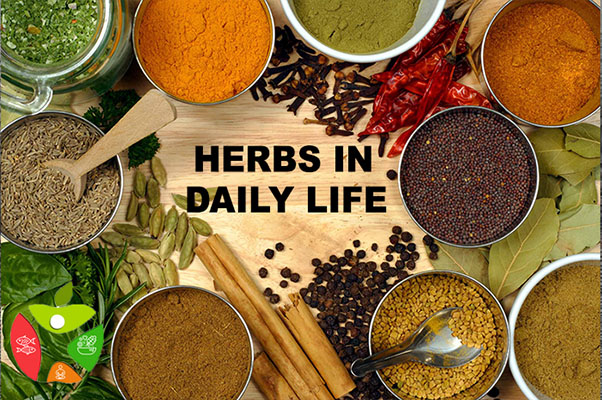Herbs in Daily Life
Herb is any plant with leaves, seeds, or flowers that have aromatic properties, and has culinary, medical, cosmetic, veterinary or other use of some kind. The useful part is different with every plant, it can be the leaves, flowers, roots, barks or seeds. In other words the plants, which can be a tree or shrub, a weed or an exotic flower, or one of the common group of plants with useful properties are collectively known as “herbs.”
Herbs have been used since ancient times for their medicinal properties, mostly concentrated into teas and tinctures. More recently, their healthful value as a food ingredient has been realized. For one, herbs add a burst of flavor to food, several herbs, including parsley, have significant amounts of the essential vitamins such as Vitamin A, C and K and antioxidants.
The true power of herbs lies in their wealth of protective polyphenols — plant compounds with potent antioxidant and anti-inflammatory effects. Plenty of studies show that polyphenols in herbs help combat such diseases as cancer, heart disease, Alzheimer’s, diabetes and more. Polyphenols are anti-microbial, so they can help protect us from harmful bacteria as well.
Herbs such as Chamomile, Calamus, Bishop’s Weed (Ajwain), Basil, Cardamom, Chrysanthemum, Coriander, Fennel, Peppermint and Spearmint, Cinnamon, Ginger and Turmeric are helpful in promoting good blood circulation. Therefore, they are used as cardiac stimulants.
Benefits of inculcating herbs in day to day life :
Strengthen the Immune System: Herbs are rich in antioxidants, phytosterols, vitamins, and other nutrient substances that equip the body to fight against toxins and germs. They help in boosting the immune system as well. In fact, you can call herbs as ‘medicines’ when taken in small dosages. Some of these immune-boosting herbs are elderberry, garlic, ginger, onion, hibiscus, cinnamon, and goldenseal.
Anti-inflammatory Properties: The essential oils present in some herbs, like ginger root, have excellent anti-inflammatory properties. These herbs inhibit the enzyme cyclooxygenase (COX), which facilitates inflammatory reactions in the body. This is the reason why herbs are excellent natural remedies for conditions like inflammation, osteoarthritis, and rheumatoid arthritis, and inflammatory bowel ailments like ulcerative colitis.
Reduce Blood Sugar & Cholesterol Levels: Some herbs have positive effects on the pancreas, thereby balancing blood sugar levels. They have reportedly controlled many cases of Type I or Type II diabetes. For instance, fenugreek, bilberry, and cayenne pepper extracts are said to be good blood sugar-stabilizing herbs. Herbs like psyllium, fenugreek, and licorice can result in a noteworthy reduction of cholesterol and blood pressure levels, thereby preventing various coronary ailments.
Most common herbs are as safe as food. However, many contain potent chemical constituents that can harm if used carelessly, and some of the most virulent of poisons come from plants. There is also the fact that for every substance in the world, there is someone who is allergic to it. So, all herbs should be used with caution and respect.
Book Free Consultation with : Best Dietician in Delhi for Weight Loss


Yes, there’s no doubt that we have been blessed with this knowledge since time immemorial. But it is a good idea to educate people on it as it’s mostly used out of habit with our people. Thank you for your efforts.